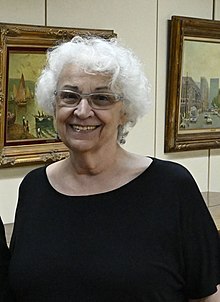
Luiz Inácio Lula da Silva, known as Lula, is a Brazilian politician who is the 39th and current president of Brazil. A member of the Workers' Party, he previously served as the 35th president of Brazil from 2003 to 2010.

| seats3_title = Federal Senate

Maria Lucélia dos Santos is a Brazilian actress, director and producer. She received international acclaim for her leading role in the 1976 Rede Globo telenovela Isaura, The Slave Girl, broadcast in over 80 countries.

Landless Workers' Movement is a social movement in Brazil, inspired by Marxism, generally regarded as one of the largest in Latin America with an estimated informal membership of 1.5 million across 23 of Brazil's 26 states. MST defines its goals as access to the land for poor workers through land reform in Brazil and activism around social issues that make land ownership more difficult to achieve, such as unequal income distribution, racism, sexism, and media monopolies. MST strives to achieve a self-sustainable way of life for the rural poor.

The Democratic Labour Party is a political party in Brazil.

The Socialism and Liberty Party is a left-wing political party in Brazil. The party describes itself as socialist and democratic.
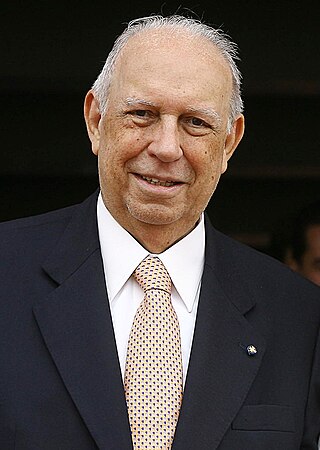
José Alencar Gomes da Silva was a Brazilian businessman, entrepreneur and politician who served as the 23rd vice president of Brazil from 1 January 2003 to 31 December 2010. In business from a young age, Alencar became a self-made multimillionaire as the chief executive of Coteminas, a leading textile manufacturer. In the 1990s, Alencar groomed his son to succeed him at the company.
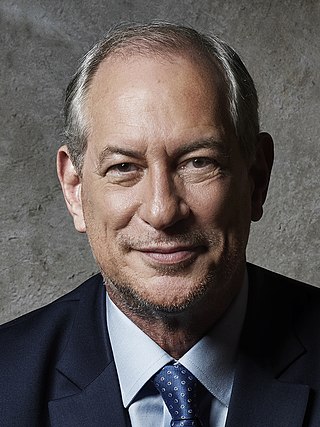
Ciro Ferreira Gomes, known mononymously as Ciro, is a Brazilian politician, lawyer, and academic. Ciro is currently affiliated with and vice-president of the Democratic Labour Party (PDT).
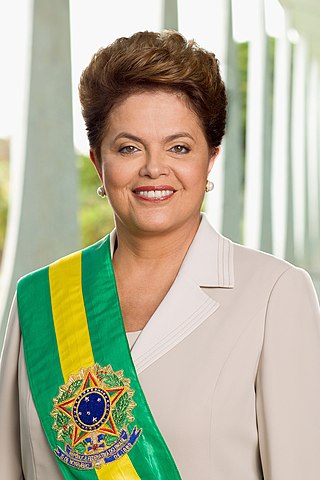
Dilma Vana Rousseff is a Brazilian economist and politician who served as the 36th president of Brazil, holding the position from 2011 until her impeachment and removal from office on 31 August 2016. She is the first woman to have held the Brazilian presidency and had previously served as chief of staff to former president Luiz Inácio Lula da Silva from 2005 to 2010.

The Minister Head of the Civil House of the Presidency of the Republic is the chief of staff of the Presidency of the Federative Republic of Brazil, and a member of the President's cabinet. The post was established on 1 December 1938.
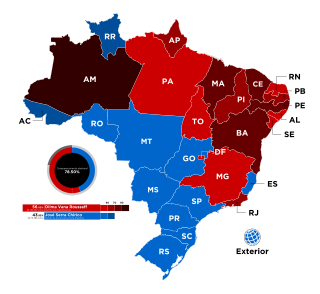
General elections were held in Brazil on 3 October 2010 to elect the president, National Congress and state governors. As no presidential candidate received more than 50% in the first round of voting, a second round was held on 31 October to choose a successor to Luiz Inácio Lula da Silva of the Workers' Party (PT), who was constitutionally ineligible to run for a third term as he has already served two terms after winning the elections in 2002 and being re-elected in 2006.
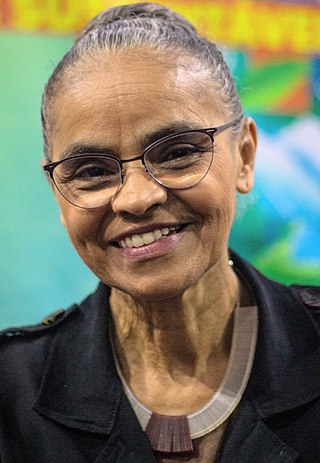
Maria Osmarina Marina da Silva Vaz de Lima is a Brazilian politician and environmentalist who currently serves as Brazil's Minister of the Environment and Climate Change. She is the founder and former spokeswoman for the Sustainability Network Party (REDE). During her political career, Silva served as a senator of the state of Acre between 1995 and 2011 and Minister of the Environment from 2003 to 2008. She ran for president in 2010, 2014 and 2018.
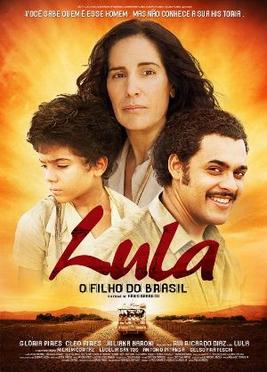
Lula, Son of Brazil is a 2009 biographical Brazilian film based on the early life of Brazilian president Luiz Inácio Lula da Silva. Directed by Fábio Barreto, the film was released on January 1, 2010. Upon its release, Lula, Son of Brazil was the most expensive Brazilian film ever, with a budget of over 17 million reais, being later surpassed by Nosso Lar. The film was unanimously chosen by a Ministry of Culture commission as Brazil's submission to the 83rd Academy Award for Best Foreign Language Film, despite not having been chosen to compete.
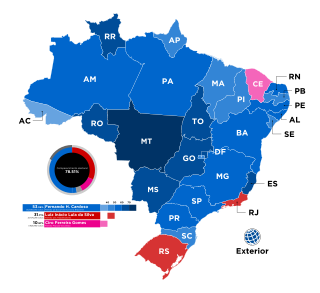
General elections were held in Brazil on 4 October 1998 to elect the President, National Congress and state governorships. If no candidate in the presidential election received more than 50% of the vote in the first round, a second-round runoff would have been held on 25 October. The election saw voting machines used for the first time in Brazilian history.
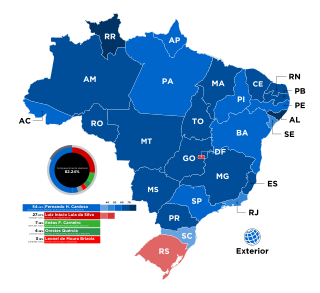
General elections were held in Brazil on October 3, 1994, the second to take place under the provisions of the 1988 constitution and the second direct presidential election since 1960.

In 2015 and 2016, a series of protests in Brazil denounced corruption and the government of President Dilma Rousseff, triggered by revelations that numerous politicians allegedly accepted bribes connected to contracts at state-owned energy company Petrobras between 2003 and 2010 and connected to the Workers' Party, while Rousseff chaired the company's board of directors. The first protests on 15 March 2015 numbered between one and nearly three million protesters against the scandal and the country's poor economic situation. In response, the government introduced anti-corruption legislation. A second day of major protesting occurred 12 April, with turnout, according to GloboNews, ranging from 696,000 to 1,500,000. On 16 August, protests took place in 200 cities in all 26 states of Brazil. Following allegations that Rousseff's predecessor, Luiz Inácio Lula da Silva, participated in money laundering and a prosecutor ordered his arrest, record numbers of Brazilians protested against the Rousseff government on 13 March 2016, with nearly 7 million citizens demonstrating.

Lulism is a political ideology describing the 2006 consolidation of segments of Brazilian society previously hostile to social movements and the Workers' Party behind political forces led by President Luiz Inácio Lula da Silva. The controlled reformism and limited structural change focused on the poorest sections of society. The lower classes, who had distanced themselves from Lula, accepted his candidacy after his first term as President as the middle class turned from him. The rhetoric and praxis which united the maintenance of stability and state distributism are the origins of Lulism. While advocating socialism, Lulism aims for a 'social liberal' approach that gradually resolves the gap between the rich and the poor in a market-oriented way.

General elections were held in Brazil on 2 October 2022 to elect the president, vice president, the National Congress, the governors, vice governors, and legislative assemblies of all federative units, and the district council of Fernando de Noronha. As no candidate for president—or for governor in some states—received more than half of the valid votes in the first round, a runoff election for these offices was held on 30 October. Luiz Inácio Lula da Silva received the majority of the votes in the second round and became president-elect of Brazil.

The First presidency of Lula da Silva corresponds to the period in Brazilian political history that began with the inauguration of Luiz Inácio Lula da Silva as President on January 1, 2003, in his fourth candidacy for this office and after defeating the PSDB candidate, José Serra, with 61.27% of the valid votes in a second round. Lula was the first former worker to become president of Brazil, and he governed the country for two consecutive terms. In October 2006, Lula was reelected to the presidency, defeating the PSDB candidate Geraldo Alckmin in the second round, obtaining more than 60% of the valid votes against 39.17% for his opponent. His term in office ended on January 1, 2011. Lula's government ended with record approval from the population, with more than 80% positive ratings.
General elections will be held in Brazil on 4 October 2026 to elect the president, vice president, members of the National Congress, the governors, vice governors, and legislative assemblies of all federative units, and the district council of Fernando de Noronha. If no candidate for president—or for governor in some states—received more than half of the valid votes in the first round, a runoff election for these offices will be held on 31 October.
